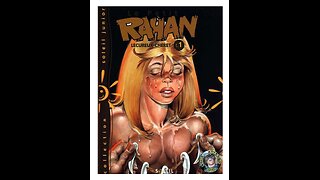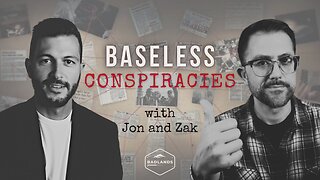Premium Only Content

The 4th Political Theory by Alexander Dugin
Welcome to the Dalek Channel.
Today we are pleased to present a short precis of the fourth political theory by Alexander Dugin.
========================
This is not an endorsement,
merely an attempt at a faithful abbreviation
========================
When the notions of Right and Left have become politically meaningless, in the West as much as everywhere else in the world; when liberals and libertarians agree on the essentials; when the three grand political theories of the Twentieth century — capitalism, Communism and fascism — have ultimately proven incapable of governing peoples peaceably, what is left to do?
According to Alexander Dugin, a teacher of sociology and geopolitics at the renowned Lermontov University of Moscow, and one of the most influential intellectuals in Russia, only one, radical solution remains: to devise a different approach, a Fourth Political Theory.
According to Dugin, the primary target must be Western postmodernism: we must wage war upon this thalassocratic Empire — a morbid blend of the society of the spectacle and consumer culture — and its plan for ultimate world domination.
In today’s world, politics appears to be a thing of the past, at least as we used to know it. Liberalism persistently fought against those of its political enemies which had offered alternative systems; that is, conservatism, monarchism, traditionalism, fascism, socialism, and Communism, and finally, by the end of the Twentieth century, had defeated them all.
The three main ideologies of the Twentieth century were liberalism, Communism and fascism
Liberalism had been an ideology from the start. It was not as dogmatic as Marxism, but was no less philosophical, graceful, and refined.
The subject of Communism was class. Fascism’s subject was the state, in Italian Fascism under Mussolini, or race in Hitler’s National Socialism. In liberalism, the subject was represented by the individual, freed from all forms of collective identity and any membership.
Having triumphed, liberalism disappears and turns into a different entity — into postliberalism.
The Fourth Political Theory will not simply be handed to us without any effort. It may or may not emerge. The prerequisite for its appearance is dissent.
The Fourth Political Theory cannot be the continuation of either the second political theory or the third. The end of fascism, much like the end of Communism, was not just an accidental misunderstanding, but the expression of a rather lucid historical logic.
The Fourth Political Theory is a ‘crusade’ against postmodernity, the post-industrial society, liberal thought realised in practice, and globalisation, as well as its logistical and technological bases.
The second and third political theories are unacceptable as starting points for resisting liberalism, particularly because of the way in which they understood themselves, what they appealed to, and how they operated.
Tradition religion, hierarchy, and family and its values were overthrown at the dawn of modernity.
If modernism is exhausted in postmodernity then the period of direct theomachy comes to an end along with it.
Following the logic of postliberalism, this will likely lead to the creation of a new global pseudo-religion, based on scraps of disparate syncretic cults, rampant chaotic ecumenism, and tolerance.
Thus, the Fourth Political Theory may easily turn toward everything that preceded modernity in order to draw its inspiration.
If we reject the idea of progress that is inherent in modernity, which as we have seen, has ended, then all that is ancient gains value and credibility for us simply by virtue of the fact that it is ancient.
The old alternatives to liberalism — Communism and fascism — were overcome by history and discarded, each in its own way, and have demonstrated their ineffectiveness and incompetence. Therefore, the search for an alternative to liberalism must look somewhere else. The area to be searched is designated as the domain of the Fourth Political Theory.
What the Fourth Political Theory is, in terms of what it opposes, is now clear. It is neither fascism, nor Communism, nor liberalism.
In each of the three ideologies there is a clearly defined historical subject.
In liberal ideology, the historical subject is the individual.
The historical subject of the second political theory is class. Exploited classes are the core of the Communists’ dramatic vision of history
And, finally, the subject of the third political theory is either the State, as in Italian Fascism or race, as in German National Socialism.
The definition of a historical subject is the fundamental basis for political ideology in general, and defines its structure. Therefore, in this matter, the Fourth Political Theory may act in the most radical way by rejecting all of these constructions as candidates for a historical subject. The historical subject is neither an individual, nor class, nor the state, nor race. This is the anthropological and the historical axiom of the Fourth Political Theory.
Undoubtedly racist is the idea of unipolar globalisation. It is based on the idea that the history and values of Western, and especially American, society are equivalent to universal laws, and artificially tries to construct a global society based on what are actually local and historically specific values.
First and foremost, the Communist theories regarding historical materialism and the notion of unidirectional progress are inapplicable to our purposes. Materialist reductionism and economic determinism comprise the most repulsive aspect of Marxism.
Marxism is often correct when it describes its enemy, especially the bourgeoisie. However, its own attempts to understand itself lead to failure. It eventually collapsed even in those places where it had triumphed. In the end, European revolutionary Communists turned into petty-bourgeois clowns, entertaining the bored and jaded democratic public.
Liberalism as a whole rests on the individual as its most basic component. It is these individuals, collectively but in isolation from one another, that are taken as the whole
The neuroses and fears located at the pathogenic core of liberal philosophy are clearly seen in The Open Society and its Enemies, a classic of neo-liberalism by Karl Popper.
Freedom is the greatest value of the Fourth Political Theory, since it coincides with its centre and its dynamic, energetic core. The freedom of an individual is a prison. In order to attain true freedom, we must go beyond the limits of the individual.
This is the flip side of liberalism: at its core, it is totalitarian and intolerant of differences, and most especially opposed to the realisation of a great will. It is only prepared to tolerate small people; it protects not so much the rights of man, but, rather, the rights of a small man.
Unlike other political theories, the Fourth Political Theory does not want to lie, soothe, or seduce. It summons us to live dangerously, to think riskily, to liberate and to release all those things that cannot be driven back inside. The Fourth Political Theory trusts the fate of Being, and entrusts fate to Being.
The idea of modernisation is based on the idea of progress.
An animalistic form of aggression is embedded in the liberal idea of progress, which is regarded as the main trajectory of social development.
If we understand modernisation like liberal democrats, then that means that we are invited to join in this terrible struggle for survival at its greatest intensity, and to become just like them, trying to grab a place at the trough of globalisation.
In Communism, the idea of unidirectional progress is also present. Once again, we see Darwinism in Marxism, including the full acceptance of evolutionary ideas and its belief in the miraculous power of scientific progress and technological improvement. In one way or another, all three ideologies originate from the same trend: the idea of growth, development, progress, evolution, and of the constant, cumulative improvement of society.
All the processes which accumulate only one particular thing, or emphasise only one particular trait, result in death. Monotonic processes do not exist in any biological species, from cells to the most complex organisms.
In our society today we see an unprecedented level of technological progress along with unbelievable moral degradation.
The Fourth Political Theory must take a step toward the formulation of a coherent critique of the monotonic process.
Three political theories have been produced from the ideology of modernity. The Fourth Political Theory is an unmodern theory. The Fourth Political Theory is not an invitation to a return to traditional society; i.e., it is not conservatism in the conventional sense.
The New World Order as a concept was popularised at a concrete historical moment — namely, when the Cold War ended in the late 1980s. The US is now undergoing a test of its global imperial rule and has to deal with many challenges, some of them quite new and original.
This US-centric global geopolitical arrangement can be described on several different levels:
Historically: The USA considers itself to be the logical conclusion and peak of Western civilisation. The peak of the political thought of modernity was the victory of liberalism over the alternative political doctrines of modernity.
Ideologically: There is a tendency for the US to increasingly link ideology and politics in their relations with the periphery.
Economically: The US economy is challenged by Chinese growth, energy security and scarcity, crippling debt and budget deficits.
The vision of a single open and, by necessity, largely homogenous society encompassing the Earth is so fantastic and utopian that it is much easier to imagine the total chaos of Hobbes’ war of all against all.
There are secondary and tertiary actors that are inevitable losers in the case of the success of the American strategies.
The first category is composed by the more or less successful nation-states that are not happy to lose their independence to a supranational exterior authority.
The second category of actors who reject the transition consists of sub-national groups, movements, and organisations that oppose American dominance of the structures of the global geopolitical arrangement for ideological, religious, and/or cultural reasons.
The paradox is that in the process of globalisation, which aims to universalise and make uniform all particularities and collective identities on the basis of a purely individual identity, such sub-national actors easily become transnational — the same religions and ideologies often being present in different nations and across state borders.
The pole of a unipolar world is nothing other than the United States and Europe, as a purely geopolitical organisation, and specifically the idea of maximal freedom.
Incidentally, emerging from that same liberal thesis which contends that man is free, it follows that he is always free to say ‘no’, to say this to whomever he will. This, in fact, constitutes the dangerous moment of the philosophy of freedom, which under the aegis of absolute freedom begins to remove the freedom to say ‘no’ to freedom itself.
There is, nevertheless, the ontological possibility of saying ‘no’. And from this begins conservatism. The first approach is so-called traditionalism. Conservatism could well be traditionalism.
There is also fundamental conservatism in our society. The Islamic project is fundamental conservatism. In fundamental conservatism, the renunciation of modernity has a perfectly rational and systematic form.
There is a second type of conservatism, which we have called status-quo or liberal conservatism. Liberal conservatives are distinguished by the following qualitative structural characteristics: agreement with the general trends of modernity, but disagreement with its more avant-garde manifestations, which seem excessively dangerous and unhealthy.
There exists yet a third kind of conservatism. The peak of degeneration, from the point of view of Conservative Revolutionaries, is modernity. Conservative Revolutionaries want not only to slow time down, like the liberal conservatives, or to return to the past like traditionalists, but to pull out from the structure of the world the roots of evil, to abolish time as a destructive quality of reality, and in so doing fulfilling some kind of secret, parallel, non-evident intention of the Deity itself.
The term civilisation received wide circulation in the epoch of the rapid development of the theory of progress.
Faith in the progressive development of history, in the universality of the human path according to a common logic of development from savagery to civilisation, was the distinguishing feature of the Nineteenth century.
The main characteristic of civilisation is often thought to be an inclusive universality; that is, the theoretical openness of the civilisational code for those who would like to join it from without.
Big and developed collectives of people, united in a civilisation, in essence simply repeat, on a different level, the archetypes of the behaviour and moral systems of savages.
Opposition to globalism, which announces itself ever more loudly on all levels and in all corners of the planet, has not yet formed into a concrete system of views.
National governments, as a rule, do not have enough of a scope to throw down a challenge to the highly developed technological might of the West.
After Carl Schmitt, it is customary in political science to call analogical projects of integration large spaces.
The creation of a European Union shows that the embodiment of the large space in practice, the transition from a government to a supra-governmental establishment.
Huntington separates out the following. Western, Chinese, Japanese Islamic Indian Slavic-Orthodox, Latin American, and African civilisations.
Despite the deep and sure observations of its own best intellectuals, many representatives of the political establishment of the USA continue as before to use the term civilisation in a singular sense, understanding by it American civilisation.
From the position of today’s historical experience, one can identify three foundational directions in Leftist political philosophy, The Old Left, Left Nationalists and the New Left.
The adherents of this persuasion almost always relate only with distrust to other anti-liberal theories, and are typically closed to dialogue and are degenerating into a sect.’
National Communists themselves reckon themselves as being simply Communists and Orthodox Marxists, strictly following the teachings of the Communist classics.
The phrase Leftist project more than anything today fits the New Left or postmodernists.
The New Leftists doubt the structure of reason, they contest the basis of our conception of reality, disrobe positive science as a mystification and dictatorship of the academic circles and sharply criticise the concept of man as a totalitarian abstraction.
Liberalism is a political and economic philosophy and ideology, embodying in itself the most important force-lines of the modern age and of the epoch of modernity:
The understanding of the individual as the measure of all things;
Belief in the sacred character of private property;
The assertion of the equality of opportunity as the moral law of society;
Belief in the ‘contractual’ basis of all sociopolitical institutions, including governmental;
The abolition of any governmental, religious and social authorities who lay claim to ‘the common truth’;
The separation of powers and the making of social systems of control over any government institution whatsoever;
The creation of a civil society without races, peoples and religions in place of traditional governments;
The dominance of market relations over other forms of politics (the thesis: ‘economics is fate’);
Certainty that the historical path of Western peoples and countries is a universal model of development and progress for the entire world, which must, in an imperative order, be taken as the standard and pattern.
Liberals go rather far, repudiating practically all sociopolitical institutions, right up to the family and sexual differentiation. In extreme cases, liberals support not only the freedom of abortions, but even the freedom from sexual differentiation.
Exactly on the strength of the fact that the USSR lost and fell apart, it became obvious that historical right was on the side of the liberals.
In this situation the USA, as the citadel of world liberalism, took on a new quality. From this time on, it became not only one of two superpowers, but the single planetary hero, suddenly pulling away from its rivals.
After defeating its rivals, liberalism brought back a monopoly on ideological thinking; it became the sole ideology, not allowing any other alongside itself.
The usual phenomenon now is the loss of identity, and already not simply only national or cultural identity, but even sexual, and soon enough even human identity.
Liberalism is an absolute evil; not only in its factual embodiment, but also in its fundamental theoretical presuppositions.
Consciousness of time is necessary to hide the present, which is the traumatic experience of the self-referential nature of pure consciousness.
Without self-referential consciousness, there can be no time.
When we understand history and its logic well, we can easily guess what will follow, what is going to happen, and which note should come next.
The histories of different societies are different.
The future is being made now.
It is doubtful that one society is capable of comprehending another society at the same level as it is comprehended by its own members.
The attempt to abdicate this history in favour of pure universalism and in favour of meta-culture and meta-language is doomed.
Globalisation is equivalent to the end of history. Both go hand-in-hand. They are semantically linked. Different societies have different histories. That means different futures.
What man is, is derived not from himself as an individual, but from politics. It is politics, being the dispositive of violence and legitimate power, that defines the man.
At this stage we are able to single out completely new symptoms of the type of man constituted by the politics of postmodernity: depolitisation, autonomisation, microscopisation, and sub- and transhumanisation.
In the end, all forms of vertical symmetry the orientation of a top to bottom hierarchy are subject to destruction, and everything becomes horizontal.
The entirety of the Twentieth century was filled with political soldiers killing each other for their beliefs.
The liberals’ fears, taking the form of fascists, is a complete parody. The late Communists were already pseudo-political soldiers. At least our liberals, who are not really liberals at all, demonstrate this: give them some money, and they will declare anything and everything.
The adherents of the Fourth Political Theory are in need of a plan.
What is Fourth Political Practice? It is contemplation. What is the manifestation of the Fourth Political Practice? It is a principle to be revealed.
It is acceptable to consider ‘a gender’ in sociological terms, in other words, gender as a socially-constructed phenomenon. This is in contrast to the anatomical ‘sex’ inherent in biological terms.
Liberal feminism, or the aspiration to give women freedom, means to identify a woman as a man and thus equalise them socio-politically, that is, represent a woman as a man socially.
The current world is unipolar, with the global West as its centre and with the United States as its core.
When there is only one power which decides who is right and who is wrong, and who should be punished and who not, we have a form of global dictatorship.
If we free socialism from its materialist, atheistic and modernist features, and if we reject the racist and narrow nationalist aspects of the Third Way doctrines, we arrive at a completely new kind of political ideology. We call it the Fourth Political Theory, or 4PT, the first being liberalism, that we essentially challenge; the second being the classical form of Communism; and the third being National Socialism and fascism.
But there are some who think otherwise. Who are aligned against such a project? Those who want to impose uniformity, the one (American) way of life, One World. And their methods are force, temptation, and persuasion. They are against multipolarity. So they are against us.
=============
https://www.goodreads.com/book/show/15785079-the-fourth-political-theory
#DNN DNN #Dalek Dalek #PukeOnAPlate PukeOnAPlate #Dugin Dugin
-
 31:16
31:16
PukeOnABook
1 month agoRahan. Episode 176. By Roger Lecureux. The Little Rahan. A Puke(TM) Comic.
30 -
 LIVE
LIVE
The Bubba Army
4 days agoChicago BloodBath! 54 Shot, 7 Dead- Bubba the Love Sponge® Show | 9/02/25
4,648 watching -

BEK TV
3 days agoTrent Loos in the Morning - 9/2/2025
8.63K1 -
 10:47
10:47
Nikko Ortiz
19 hours ago15 Seconds Of Fame Gone WRONG...
124K14 -
 14:47
14:47
GritsGG
1 day agoRumble Tournament Dubular! Rebirth Island Custom Tournament!
83.9K5 -
 1:36:05
1:36:05
Side Scrollers Podcast
21 hours agoStreamer ATTACKS Men Then Cries Victim + Pronoun Rant Anniversary + More | Side Scrollers
93.5K13 -
 LIVE
LIVE
Lofi Girl
2 years agoSynthwave Radio 🌌 - beats to chill/game to
233 watching -
 42:55
42:55
Stephen Gardner
1 day ago🔥Trump’s SURPRISE Move STUNS Everyone - Democrats PANIC!
118K131 -
 1:37:19
1:37:19
Badlands Media
19 hours agoBaseless Conspiracies Ep. 148: The Delphi Murders – Secrets, Setups, and Cover-Ups
64.4K23 -
 5:59:05
5:59:05
SpartakusLIVE
13 hours ago#1 MACHINE Never Stops The GRIND || LAST Stream UNTIL Friday
165K5